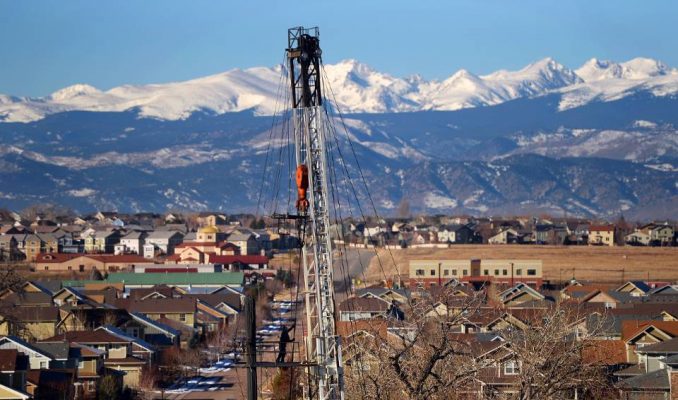



“For years we have known that leaking underground pipes carrying oil and gas and processing waste regularly contaminate soil and water and potentially threaten thousands of people around the state, records show, “ wrote the Denver Post on May 17.
The process of fracking — hydraulic fracturing — involves drilling deep wells and injecting into them a mix of chemicals, sand and millions of gallons of water per well at high pressure. This splits the rock along fissures, allowing oil and gas to be released.
Fracking to obtain gas was introduced in Colorado in 1973, replacing earlier methods of extraction. By the early 1990s, such drilling was massive as companies became able to drill vertically and horizontally. Today it is possible to drill vertically as deep as five miles and then horizontally for five more miles. Colorado wells are usually two miles deep and two miles wide.
In a state concerned about having enough clean water for agriculture and for people to drink and use, the amount of water used in fracking is astounding. It requires 6 to 8 million gallons to frack one well. Each well can be fracked up to 18 times.
There are now 53,000 active and 36,500 inactive wells in Colorado and thousands of miles of pipeline. Many of these pipes are encased in cement, which crumbles over time. It wasn’t until 2016 that the state began monitoring underground pipes connected to wells, tanks and other equipment.
Leaks and spills from broken pipes and crumbling infrastructure cause thousands of incidents that pollute groundwater. This was known and reported in a 2014 risk study prepared for lawmakers by the Colorado Oil and Gas Conservation Commission.
However, no monitoring program exists to identify crumbling and deteriorating pipelines or other problems, such as spills. Most regulations rely on company self-reporting. Yet audits show that the industry barely keeps records for about 10 percent of the flowlines — amounting to 2,700 wells.
Gas explosion claims lives
It has taken tragedies like the explosion and loss of life in Firestone, Colo., this April 17 and complaints from people in other communities across the state to shed light on this crisis.
The Firestone explosion, which caused two deaths in one family and serious injuries in others, resulted from cutting a pipe leading from a well that had been dormant but was reopened in January by Anadarko Petroleum Corp. The break happened only a few feet from the family’s basement. The pipe was still connected to a well only 182 feet away.
Gas from wells around a nearby housing development had begun to accumulate in the area. Since the explosion, Anadarko has shut the wells and put gas meters in the houses, but the local people are not convinced they are safe.
A few miles from the first explosion, a storage tank also owned by Anadarko exploded on May 25, killing one worker and injuring three more. Another gas leak in May forced residents of Peetz to leave their homes for three days.
According to Occupational Safety and Health Administration data covering 2003 to 2010, the workers in this industry suffer a very high death rate associated with explosions, fires, chemicals, sand, dust and fracking noise. The study reported 823 deaths in the oil and gas industry — a fatality rate seven times greater than the average for all U.S. industries.
OSHA found that jobs related to fracking caused more deaths and health hazards than any other industry. Despite these risks, workers continue to flock to these jobs because the pay remains higher, even as real wages decline in other industries.
Profit is driving factor
The state of Colorado has experienced a gold-rush atmosphere that is chaotic, thoughtless and selfish. While the Colorado oil and gas industry has made a great deal of money, inspections, health and environmental issues are not being addressed.
For the workers, fear of unemployment is a serious concern. They need to be retrained for jobs in renewable energy so they will be able to support their families without endangering their health and polluting the planet.
What types of fuels we use can no longer be dictated by companies making fabulous profits or paying better wages while destroying workers’ health. Profits are the motivating factor under capitalism, but people and the planet must come first.
To be continued.
In its ongoing genocidal campaign against the Palestinian people, Israel used drones May 2 to…
Palestinian and regional factions condemned the Israel Occupation Forces’ attack today on the Al-Dameer (Conscience)…
A message for May Day: ‘Workers of the world unite, Palestine is our fight!’ International…
Africa is rising, the days of colonialism are finished: This is the call being echoed…
Several immigrant groups and their supporters rallied outside the federal courthouse in Philadelphia on May…
Thousands of construction workers and teachers in at least seven provinces throughout Panamá took to…